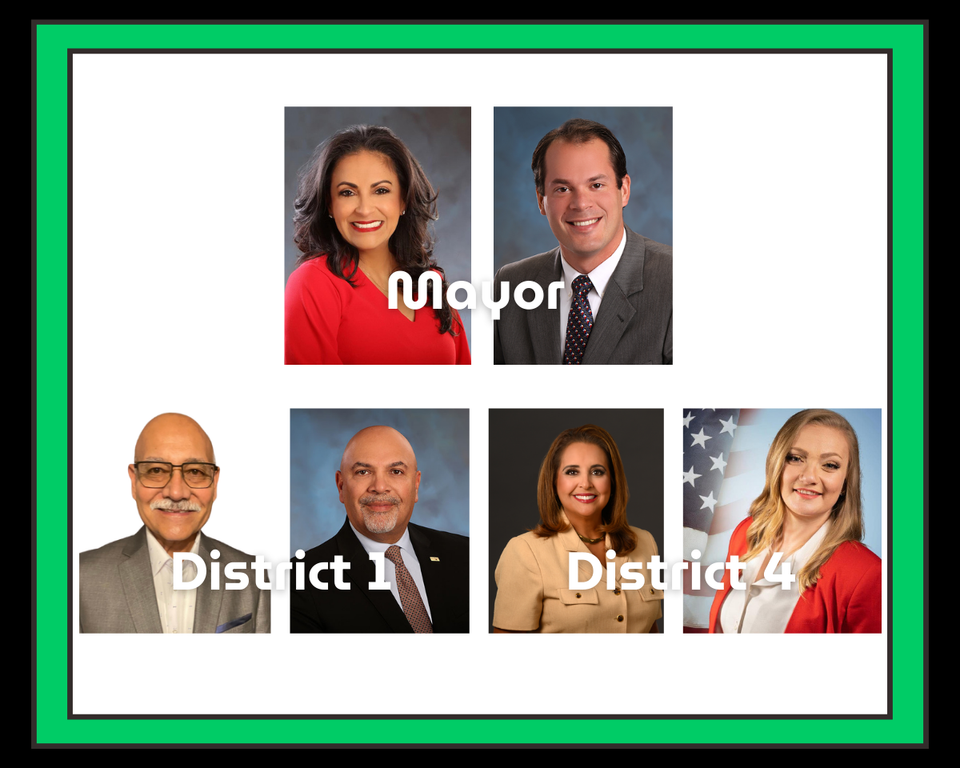Why Don’t People Vote in Runoff Elections?

On Dec. 14, three out of nine positions on Corpus Christi City Council will be on ballots in runoff races. Early voting will be from 8 a.m. to 5 p.m. Dec. 2-6; and 7 a.m. to 7 p.m. Dec. 9-10. Make a plan to vote early or on runoff election day.
Runoff races:
- Mayor: Paulette Guajardo (incumbent) vs. Michael Hunter (current councilmember at-large)
- District 1: Everett Roy (incumbent) vs. Billy Lerma
- District 4: Kaylynn Paxson vs. May Nardone Mendoza
By Julie Garcia
Do these numbers sound familiar?
28,383 – 8,403 – 5,845 – 1,234.
As the numbers dwindle lower, you should know that these few people are making decisions that affect you, your utility rates and whether your child can check out a library book without a guardian present.
In 2020, fewer than 29,000 people voted in the City of Corpus Christi runoff election that put current mayor Paulette Guajardo in office. This was 15.05% of registered voters in Nueces County.
In 2022, 8,403 people voted in the City of Corpus Christi runoff election that decided the council members for District 1, District 2 and District 3. That was 7.53% of registered voters in Nueces County.
Earlier this year, 7,000 people voted in the May runoff primary election for Constable of Precinct 1, and Nueces County District Attorney; only the lead prosecutor in the county, a position formerly held by lawyer Mark Gonzalez. That runoff was perhaps the most disappointing; less than 1% of registered Democrats voted in that primary, and 2.72% of registered Republicans voted.
Data shows that Corpus Christi residents can be rallied for a general election (56% of all registered voters participated in the Nov. 5 election ). But the momentum typically burns out a month later when the inevitable runoff election is held.
Why does this happen? Nueces County has a history of low voter turnout in general elections, and even lower numbers hit the polls again when it's time to choose between two candidates to name an ultimate winner.
Runoff elections are triggered when a candidate fails to garner 50% of the vote plus 1.
Daniel Potter, director of the Houston Population Research Center in the Kinder Institute for Urban Research at Rice University, said the number of voters in runoff elections depends on the significance of the vote.
This interview has been condensed for length and clarity.
Historically, do a large number of eligible voters vote in runoff elections?
The number of voters in runoff elections depends on the significance of the vote; however, regardless of a vote's significance, the runoff election will almost always have a lower turnout than the general election preceding it. A recent example of this phenomenon was the Houston mayoral race last year: in the November election, there were more than 250,000 votes cast but none of the candidates received the necessary 50% plus 1; so the race went into a run-off.
Only about 200,000 people cast a vote in the runoff election. Both of these are incredibly low voter turnout rates (for a city the size of Houston), and the runoff was even lower than the general election. The 2019 Houston mayoral election followed the same pattern: more than 240,000 people voted in the November election, but no candidates got 50%+1. A runoff was required, and only 202,000 voted in the run-off.
Does voter turnout depend more on the voting history of the county or the political race or issue on the ballot?
There's a “yes and yes” answer to this question. The voting history of a county does seem to matter, … and while there’s some blips from time-to-time, past participation is going to do a pretty good job of giving evidence of future participation (at least in a relative since — i.e., which county may have higher turnout than other counties).
The political race matters for voter turnout. Understanding the role that an issue (or issues) could have in voter turnout is a little tricky. There is evidence of issues driving people to vote in numbers they might not otherwise have voted, such as when controversial state measures or initiatives are put on the ballot. Texas does not allow state initiatives on the ballot, so it is less likely that something like that would be a motivating factor here; but in Kansas, some of the initiatives following the Dobbs decision (which overturned Roe v. Wade) are an example of voter turnout being influenced by an issue. Local initiatives and referendums are allowed on ballots in Texas, such as school bond measures. Whether those brought people to the polls is unclear.
Why don’t many people vote in runoffs?
Voting behavior is low in the U.S., with the vast majority of participation taking place in general elections. In addition to low turnout in runoffs, there is also low turnout in primaries and other non-general elections that can take place throughout the year. Reasons for the lower turnout run the gamut from lack of information to lack of awareness to lack of interest.
For smaller, local races, these can often have little or no information available about candidates which makes it difficult to research and learn about the issues and where someone stands. Since the runoff often does not get much media coverage, folks can forget or may simply not be aware. And many times people lose interest after the main election cycle has passed. Convenience and access also play a role with there being fewer polling places and days when the polls are open.
Is there a way to rethink runoff elections where people will actually vote?
Getting more information out to the public about the runoffs will certainly improve turnout. This would address issues with lack of information, as well as lack of awareness. Even if these things were done, it is unlikely they would produce a “high” voter turnout for runoffs.
Rather than look to increase voter turnout during runoffs, the need for runoffs could be eliminated by introducing rank-choice voting. While this would not inherently increase voter turnout, it would ensure that everyone who is participating has their vote counted toward deciding the ultimate winner.
Do your research!
Chisme Collective: Councilman: New Blood Could Kill Inner Harbor Desalination Plant
Caller-Times: Four seats on Corpus Christi Library Board will be up for a vote. Here’s why it matters.
Voting resources: Nueces County Elections Department, League of Women Voters Corpus Christi
